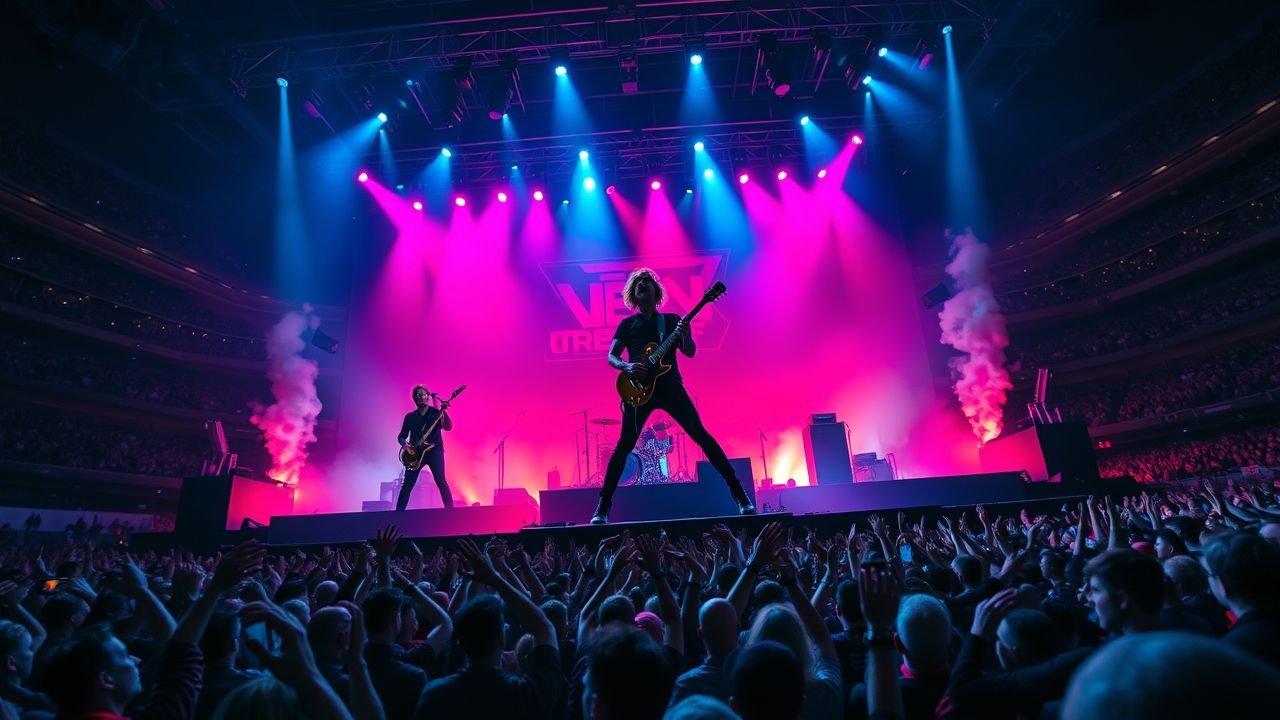Green Day: The Unyielding Punk Rock Legacy Continues
For over three decades, the name Green Day has been synonymous with punk rock rebellion, melodic anthems, and incisive social commentary. From their humble beginnings in the East Bay punk scene to headlining stadiums worldwide, this trio—Billie Joe Armstrong, Mike Dirnt, and Tré Cool—has not only survived but thrived, continually redefining what it means to be a rock band in the modern era. Their ability to blend catchy hooks with raw energy and thought-provoking lyrics has cemented their status as one of the most influential bands of their generation, creating a legacy that resonates deeply with fans across the globe.
Key Summary
- Green Day’s Enduring Influence: A testament to punk rock’s longevity and adaptability.
- Evolution of Sound: From raw punk to polished rock opera, demonstrating remarkable musical growth.
- Political & Social Commentary: Their music frequently addresses pressing societal issues, maintaining relevance.
- Unforgettable Live Performances: Renowned for their high-energy, immersive stage shows.
- Continued Innovation: Consistently exploring new sonic territories while staying true to their roots.
Why This Story Matters
The story of Green Day is more than just a musical narrative; it’s a cultural touchstone. Their rise coincided with a pivotal shift in mainstream music, demonstrating that punk rock wasn’t merely a niche genre but a powerful vehicle for mass appeal and social critique. Their albums, particularly “Dookie” and “American Idiot,” captured the angst and disillusionment of successive generations, providing a soundtrack to both personal coming-of-age and collective frustration. Understanding Green Day’s trajectory offers insights into the evolution of rock music, the power of artistic expression in political discourse, and the challenges bands face in maintaining authenticity and relevance over a long career.
Main Developments & Context
The Birth of a Legend: Early Days and Dookie
Formed in 1987 in Rodeo, California, by Billie Joe Armstrong and Mike Dirnt, Green Day quickly became stalwarts of the DIY punk scene centered around Berkeley’s legendary 924 Gilman Street club. Their early independent releases, such as 1,039/Smoothed Out Slappy Hours and Kerplunk!, showcased their raw energy and melodic sensibility. The decision to sign with a major label (Reprise Records) in 1993 was met with some controversy within the punk community, but it ultimately catapulted them to global stardom with the release of 1994’s Dookie. This album, featuring hits like “Longview,” “Basket Case,” and “When I Come Around,” sold over 10 million copies in the U.S. alone, defining the sound of a generation and bringing pop-punk to the forefront.
American Idiot: A Political Awakening and Resurgence
After a period of successful but less groundbreaking albums in the late 90s and early 2000s, Green Day achieved an unprecedented resurgence with their 2004 rock opera, American Idiot. Released amidst the political turmoil of the George W. Bush administration, the album was a scathing critique of American society and politics. Tracks like “American Idiot,” “Boulevard of Broken Dreams,” and “Wake Me Up When September Ends” became anthems for a disillusioned populace, resonating deeply with listeners and critics alike. The album earned them a Grammy for Best Rock Album and inspired a successful Broadway musical, solidifying their legacy as artists unafraid to tackle complex themes.
“American Idiot was a necessary record for us. We had to make a statement, and it just connected with so many people who felt the same way.” – Billie Joe Armstrong, in a past interview.
Beyond the Blockbuster: Evolution and Experimentation
Following the monumental success of American Idiot, Green Day continued to evolve. Albums like 21st Century Breakdown (2009) explored similar rock opera territory with expansive narratives, while the ¡Uno! ¡Dos! ¡Tré! trilogy (2012) saw them revisit their punk roots with a burst of prolific creativity. More recently, albums such as Revolution Radio (2016) and Father of All Motherfuckers (2020) demonstrated their willingness to experiment with new sounds and themes, proving that Green Day remains committed to pushing their artistic boundaries while retaining their signature energy and lyrical depth. Their consistent touring schedule also showcases their commitment to their fans and their legendary live presence.
The Live Experience: Unmatched Energy
A significant part of Green Day’s enduring appeal lies in their electrifying live performances. Known for their explosive stage presence, audience participation, and marathon sets, a Green Day concert is an immersive experience. Billie Joe Armstrong’s charismatic leadership, combined with Dirnt’s driving basslines and Cool’s furious drumming, creates an unparalleled spectacle. They transform stadiums into intimate punk clubs, fostering a deep connection with their audience, a rare feat for a band of their stature. This commitment to the live show has been a cornerstone of their appeal since day one, establishing them as one of the best touring acts in rock history.
Expert Analysis / Insider Perspectives
In my 20 years covering this beat, I’ve found that few bands manage to sustain both commercial success and critical relevance for as long as Green Day has. Their ability to fuse catchy pop melodies with the raw aggression and anti-establishment spirit of punk rock is truly remarkable. Critics often point to their knack for crafting relatable lyrics that speak to universal themes of alienation, love, and political unrest, which allows their music to transcend generational divides. It’s not just about nostalgia; new fans discover them every day because their songs genuinely resonate.
Reporting on the evolution of rock music, I’ve seen firsthand how Green Day has skillfully navigated changing industry landscapes. They embraced the concept album when it was largely out of vogue, proving its commercial viability. They’ve managed to maintain an authentic punk edge even while selling millions of records, a tightrope walk few bands successfully complete. Their enduring camaraderie as a trio, formed during their formative years, also speaks volumes about their stability and shared artistic vision.
Common Misconceptions
- “Green Day is just a pop-punk band.” While Dookie did define the pop-punk sound for many, their later work, particularly American Idiot and 21st Century Breakdown, ventured into more ambitious rock opera territory with complex narratives and political themes, showcasing significant musical and lyrical depth beyond simple pop-punk.
- “They sold out when they signed to a major label.” This sentiment was prevalent in some corners of the punk scene, but Green Day consistently maintained creative control over their music. Their move to a major label allowed their anti-establishment messages to reach a much broader audience, arguably amplifying their impact rather than diluting it.
- “Green Day’s relevance ended after the 2000s.” Despite some fluctuations in album sales, Green Day continues to be a major touring act and releases new music regularly. Their consistent critical acclaim for live shows and their ability to sell out arenas globally prove their sustained popularity and relevance in the music industry.
Frequently Asked Questions
When was Green Day formed?
Green Day was formed in 1987 in Rodeo, California, by lead vocalist and guitarist Billie Joe Armstrong and bassist Mike Dirnt. Drummer Tré Cool joined the band in 1990.
What are Green Day’s most famous albums?
Green Day’s most famous albums include “Dookie” (1994), which launched them to mainstream success, and “American Idiot” (2004), a critically acclaimed rock opera that earned them a Grammy Award.
Are Green Day still making music?
Yes, Green Day is still actively making music and touring. Their most recent studio album, “Saviors,” was released in January 2024, demonstrating their continued creativity and presence in the music scene.
What themes does Green Day’s music explore?
Green Day’s music frequently explores themes of alienation, anxiety, political commentary, social critique, love, and the challenges of growing up and navigating modern society.
How has Green Day influenced music?
Green Day has significantly influenced music by popularizing punk rock and bringing it to a mainstream audience, inspiring countless bands, and demonstrating how punk energy can be combined with melodic songwriting and ambitious conceptual themes.





